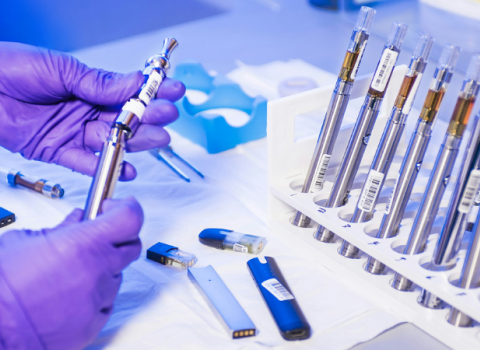
The country has a long tradition in pharmaceuticals – it was the source of most of the drugs dispensed in the eastern bloc during the Communist era. Many companies were privatised or went out of business after the fall of the Berlin Wall, but in the early 1990s, multinationals began tapping the expertise of the pharmaceuticals industry and establishing operations in Hungary.
AstraZeneca plc, for instance, opened a central and eastern European clinical research unit in Budapest in 1993, and it now employs 160 people in the region.
According to the market analysts Ernst & Young, Hungary has received more foreign direct investment per capita than any other eastern European state. In addition, the government is putting €150 million per annum into the sector.
Hungary also boasts a steady stream of highly trained researchers via its well-established scientific universities, including those in Pécs and Kaposvar.
Struggle to be saleable
But all too often, young biotech companies “struggle” to turn their expertise and ideas into saleable goods or services, says Peter Ferdinandy, a medical doctor and MBA who who is a professor and researcher at the University of Szeged. Ferdinandy works closely with the Hungarian Spin-Off Association, an organisation that supports young startups and offers a place to share advice on international marketing.
He has also formed his own company, Pharma Hungary, a service provider for preclinical and clinical research for pharmaceutical, biotech and food supplement companies in the cardiovascular field.
Besides offering advice, the Spin-Off Association aims to increase the rate of successful tech transfer at Hungarian universities by changing the way people think about commercialising their inventions.
“University people are just not trained to start companies. That’s what we’re going to change with the Spin-Off Association and the Hungarian Biotech Association,” says Ferdinandy, who is also innovation director for the medical faculty of the university.
While most large universities have established tech-transfer offices, the people working there still lack business savvy. As a professor, a company founder and a researcher, Ferdinandy sits at the crossroads of innovation in Hungary and sees the full potential of the market.
“We produce the most scientific publications per research dollar,
and Hungarian scientists are still cost-effective compared to those in
Germany. But we have a low rate of intellectual property protection.
There are a lot of good scientific publications, but a small fraction
of the results are protected.”
Lack of business culture
The cause, he argues, is a lack of business culture. “Scientists don’t think of it. They don’t go to a patent attorney before publishing a paper.”
Miklos Boda, the president of the Hungarian National Office for Research and Technology, admits Hungary has not been so good on the business side, because the country lacked a competitive business environment for so long. “Now it is much better. This could be a very good win-win situation,” he says.
Richard Schwab is a board member of the Hungarian Biotechnology Association, which was founded to help the government to develop a strategy for developing the biotech market. He believes Hungary has a niche in translating research results into the clinic because it is a small country, can react quickly and industry and government work in a synchronised fashion.
“We are quite strong and flexible in the clinical introduction of early-stage drugs and diagnostics,” says Schwab. “It’s my vision that with the biotech association of Hungary, we can help the country to become the European market entry point for companies outside the region. If a company wants to access Europe and do early stage trials, it can go to Hungary. We’re cost-effective, we’ve got the highest quality standards and it’s Europe.”
Reluctant investors
Schwab may have a point on the advantages of Hungary as a clinical research location, but convincing investors has not been so easy. Many lack an overview of the market and see investments as premature.
“Seed funding and business angels are very limited in Hungary and this part of Europe. All the investing in biotech is still at a very early stage,” according to Ferdinandy.
This has prompted the government to step in with R&D support and an active international marketing campaign. Scientists from Semmelweis University, for instance, received public funding to start a private, non-profit venture targeting rational drug design for signal transduction in the development of cancer treatments.
The money was part of a new form of public/private partnership called a Cooperative Research Centre, allowing participating institutions and companies to build joint infrastructure at major state-run universities, joining in on pre-competitive, applied research in this highly focused field.
“Hungary needs to be known as an emerging biotech country,” says Ferdinandy.
During a government-subsidised roadshow to the east coast of the US in February of this year, the 15 Hungarian companies on tour were well received by investors, companies and industry associations. The trip “exceeded expectations,” according to Balazf Szent-Ivanyi, an economist who works for Hungary’s trade development office. One company, Thales Nanotechnology,closed some sales on the trip.
Brain drain
Hungary’s efforts to market itself as a biotech hub include a plan to reverse the country’s brain drain.
“Brain drain is still a problem, but it’s difficult to measure its extent. A researcher can earn five to ten times as much in the United States, and it’s something we really can’t compete with,” says Szent-Ivanyi.
The government is trying to lure scientists home by developing the conditions they want and need. Support for entrepreneurs, deductible R&D costs and a friendly tax regime are among its tools.
But, some young researchers like Schwab are keeping themselves busy at home. Besides working as a medical doctor, doing research and being involved in the Biotech Association, Schwab will soon become a student again, at the Central European University in Budapest. When he opens the course books what will be inside them? Business, of course. Schwab will work towards an MBA.





 A unique international forum for public research organisations and companies to connect their external engagement with strategic interests around their R&D system.
A unique international forum for public research organisations and companies to connect their external engagement with strategic interests around their R&D system.